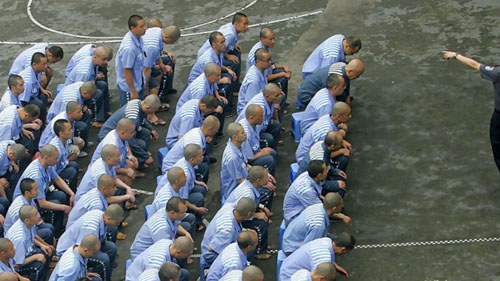by WorldTribune Staff, June 27, 2019
China is continuing the practice of forcibly harvesting the organs of political prisoners, targeting mostly religious minorities, according to an independent tribunal.
According to the 2019 final judgment and summary report by the Independent Tribunal Into Forced Organ Harvesting of Prisoners of Conscience in China, Falun Gong practitioners are a “main source” for organ supply while medical testing is also conducted on Muslim Uyghurs, at least one million of whom are in detention camps.

“Taken together, such attacks and such acts constitute crimes against humanity, which the Tribunal is certain beyond reasonable doubt or ‘so as to be sure’ has occurred,” the Tribunal’s report said.
In its previous report, in 2018, the Tribunal said forced organ harvesting “has been practiced for a substantial period of time involving a very substantial number of victims.”
The report said:
“Forced organ harvesting has been committed for years throughout China on a significant scale and that Falun Gong practitioners have been one – and probably the main – source of organ supply. The concerted persecution and medical testing of the Uyghurs is more recent and it may be that evidence of forced organ harvesting of this group may emerge in due course. The Tribunal has had no evidence that the significant infrastructure associated with China’s transplantation industry has been dismantled and absent a satisfactory explanation as to the source of readily available organs concludes that forced organ harvesting continues till today.
“Considering first three categories of evidence that can be stripped of most or all of specific focus on the Falun Gong: The description of what happens in transplant surgery; the telephone calls to Hospitals revealing availability and short waiting time for organs and the Scale of Transplant Activity in The PRC, the summaries are set out in the full Judgment, but now in shortened form as above, are: 46 a. An effective transport and organ distribution system is necessary to create a well-functioning transplant system and skilled trained teams of transplant surgeons, physicians, nurses and technicians are required. Transplantation is a highly integrated process requiring a broad range of expertise b. Telephone calls were made to hospitals and individual medical staff including senior surgeons. The hospitals telephoned were offering organs for sale Those organs were from people who were alive at the time of the calls and were available to the callers on short notice. c. Very large numbers of transplant operations have been carried out in the PRC. The Tribunal assesses as credible numbers of operations being between 60,000 and 90,000 per annum. This, when compared to the number of eligible donors in 2017 of 5146, leaves an incomprehensible gap. To achieve the numbers of transplantations performed — before and since the year of most recent estimate — there must have existed another source or other sources of tissuetyped organs; this in turn shows that there must have existed a body of donors unidentified in PRC material.
“Genocide: The Tribunal has no doubt whatsoever that physical acts have been carried out that are indicative of the crime of genocide. Reviewing the definition of genocide found in the Genocide Convention, and repeated in the Rome Statute of the ICC, the Tribunal is certain that there has been killing of members of a group, there has been caused serious bodily or mental harm to members of a group, and there has been the deliberate inflicting on the group of conditions of life calculated to bring about the group’s physical destruction in whole or in part.
“Given that there was no participation of representatives of the PRC or CCP in these hearings to address this issue, and given that no explanation has been offered to otherwise account for the release of persons detained, the Tribunal is constrained from concluding that the crime of genocide had occurred.”
Dr. Enver Tohti, 57, was among those who gave evidence to the Tribunal. He was working as a surgeon in Urumqi in northwest China in 1995 when he was asked by his bosses: “do you want to do something wild?”
As a keen young doctor, he said yes and the following day he was driven to the Western Mountain Execution Grounds where he saw around 15 bodies on the mountain side. All of them had been shot in the head.
However he was ordered to “cut deep and work fast” on one victim whom he claimed had not been anaesthetized and who had been shot in the chest.
“I started cutting down the middle and then he started struggling and I knew then that he was still alive,” the father-of-three told The Telegraph, “but he was too weak to resist me.”
“I saw there was blood coming out of the cut which means the heart is still pumping,” he added. He was ordered to remove the liver and both kidneys, sew the body back up, and “remember that today nothing happened.”
Tribunal Chairman, Sir Geoffrey Nice QC, who led the prosecution of Serbian war criminal Slobodan Milosevic at the International Criminal Tribunal, criticized the British government for failing to act.
“Governments around the world and international organizations, all required to protect the rights of mankind, have expressed doubt as to the accusations thereby justifying their doing nothing to save those who were in due course to be killed to order,” he added.
There is currently no law in the UK preventing British patients traveling to China for transplant surgery.
A Foreign and Commonwealth Office spokeswoman said: “Of course any claims of organ harvesting are disturbing. We have noted this report and will read it carefully.
“The UK government is very concerned about Human Rights in China, and Ministers raise these concerns regularly with their Chinese counterparts.”
A statement from the Chinese Embassy said: “The Chinese government always follows the World Health Organization’s guiding principles on human organ transplant, and has strengthened its management on organ transplant in recent years.”
Intelligence Brief __________ Replace The Media
